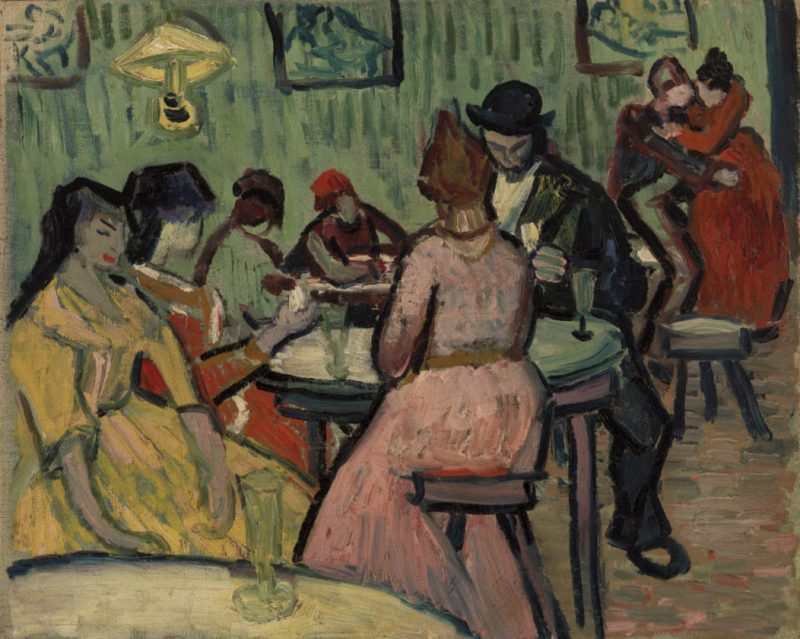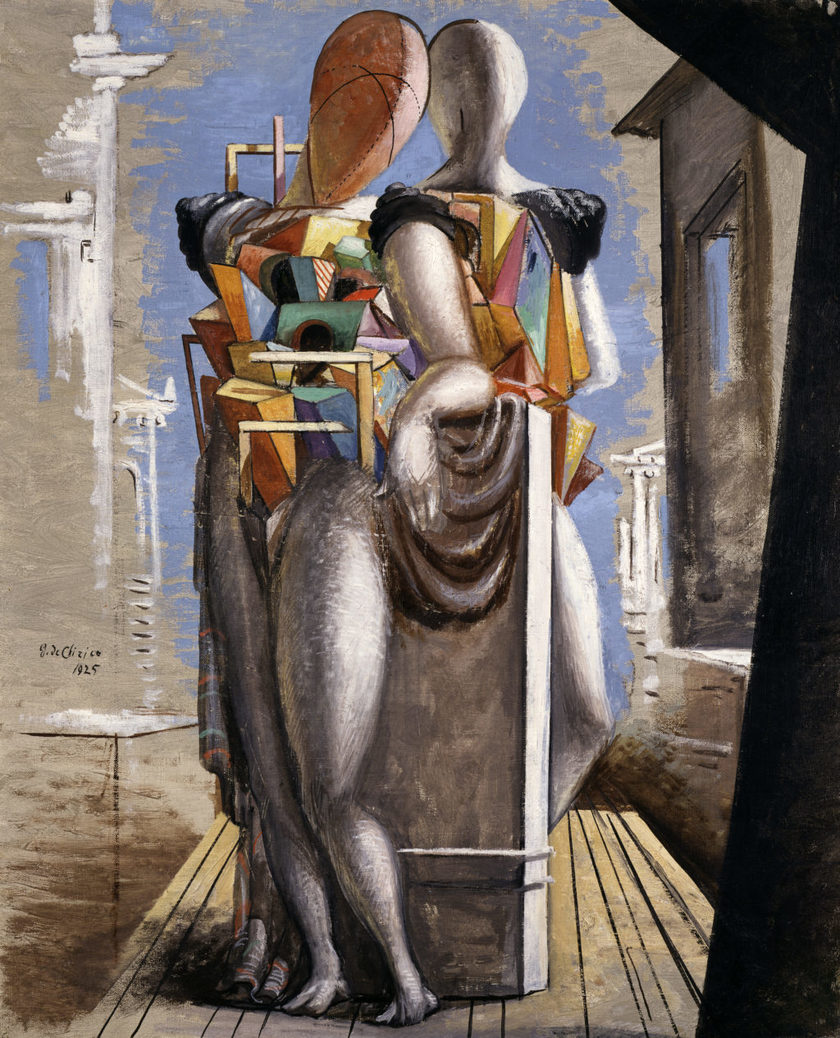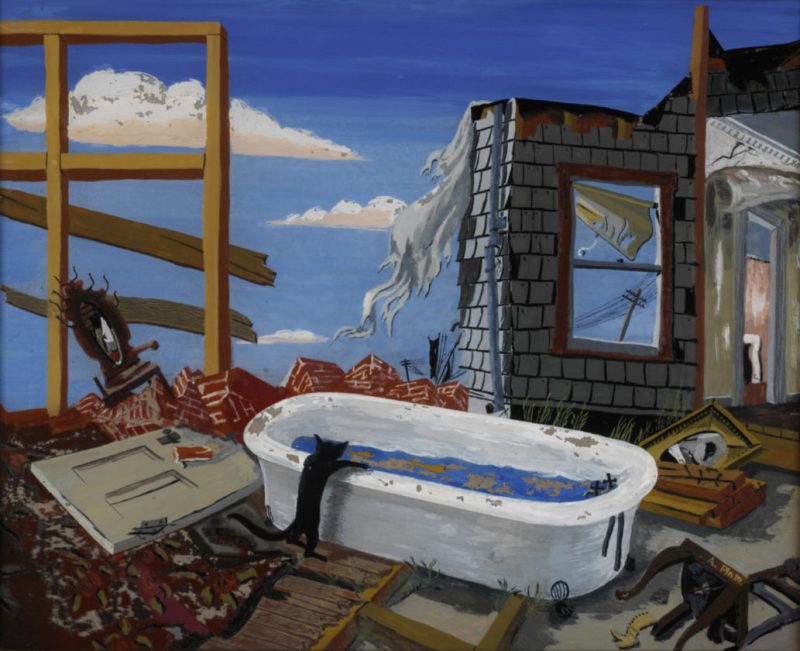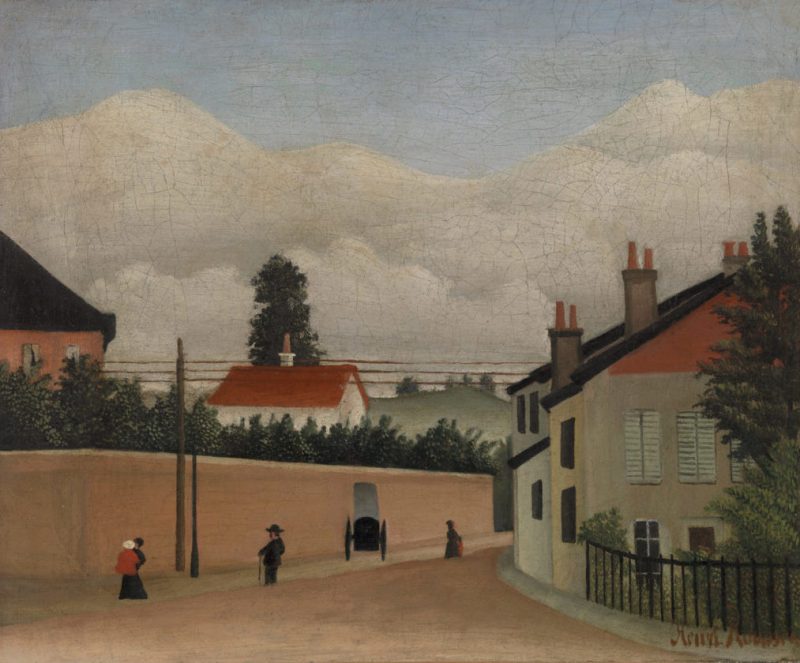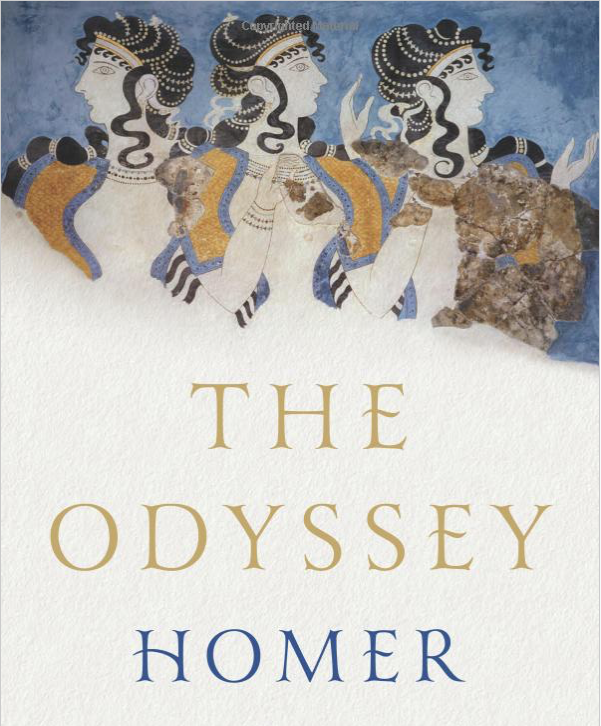[Most Recent Entries] [Calendar View]
Tuesday, November 7th, 2017
| Time | Event |
| 9:00a | 2,000+ Impressionist, Post-impressionist & Early Modern Paintings Now Free Online, Thanks to the Barnes Foundation
Georges Seurat, Henri Rousseau, Giorgio de Chirico, Auguste Renoir, Vincent Van Gogh — all of us associate these names with great innovations in painting, but how many of us have had the opportunity to look long and close enough at their work to understand those innovations? To feel them, in other words, rather than just to know about them? The Barnes Foundation in Philadelphia has just recently made it possible for us to contemplate thousands of works of art including those of Impressionist, Post-Impressionist, and early Modern masters, zoomed in up close and at any length we like, by digitizing their collection and making it free online.
"Thanks to Open Access," writes Artnet's Sarah Cascone, "2,081 of the Barnes’s 4,021 objects have been published online. Of those, there are high-resolution images of 1,429 works available for download in the public domain. It’s a big step for a museum that as recently as 1991 hadn’t published any color imagery of its holdings," due in part to the preferences of founder and "eccentric art collector Alfred C. Barnes (1872–1951), who drew up strict rules for how the museum would be run." For instance, it seems that Barnes, who disapproved of the way the early color photography reproduced paintings, felt he had no choice but to ban it in his museum entirely.
"As we were rethinking the presentation of our collection online we were considering the sensitivity Barnes had around color reproduction," writes Deputy Director of Audience Engagement and Chief Experience Officer Shelley Bernstein, "but we also had to think about the needs of today’s students, researchers, and scholars. It goes without saying that the work of other institutions — the open access initiative at the Met, especially — helped make these decisions much easier." And though the Barnes first started putting its works of art on the internet five years ago, "that last iteration of the collection online didn’t foreground the ability for users to download or share images easily."
Now, the Barnes' online collection features nearly 1,500 items free to download so far. But currently downloadable or not, everything uploaded so far appears in an easily searchable, browsable, and, most of all, viewable form. Here we have van Gogh's The Brothel, de Chirico's Sophocles and Euripides, (longtime Barnes Foundation instructor) Angelo Pinto's Bathtub and Cat, and Rousseau's Outskirts of Paris, four paintings that, in many ways, look as stylistically fresh as they did when first revealed in the late 19th century to the mid-20th. The fact that 21st-century technology has made it so much easier for all humanity to see that would, one likes to think, have pleased even old Mr. Barnes himself. Enter the Barnes online collection here. Related Content: An Introduction to 100 Important Paintings with Videos Created by Smarthistory Astonishing Film of Arthritic Impressionist Painter, Pierre-Auguste Renoir (1915) Impressionist Painter Edgar Degas Takes a Stroll in Paris, 1915 Based in Seoul, Colin Marshall writes and broadcasts on cities and culture. His projects include the book The Stateless City: a Walk through 21st-Century Los Angeles and the video series The City in Cinema. Follow him on Twitter at @colinmarshall or on Facebook. 2,000+ Impressionist, Post-impressionist & Early Modern Paintings Now Free Online, Thanks to the Barnes Foundation is a post from: Open Culture. Follow us on Facebook, Twitter, and Google Plus, or get our Daily Email. And don't miss our big collections of Free Online Courses, Free Online Movies, Free eBooks, Free Audio Books, Free Foreign Language Lessons, and MOOCs. |
| 12:00p | Emily Wilson Is the First Woman to Translate Homer’s Odyssey into English: The New Translation Is Out Today
The list of English translators of Homer’s Odyssey includes an illustrious bunch of names every student of literature knows: Thomas Hobbes, Alexander Pope, William Cowper, Samuel Butler, T.E. Lawrence, Robert Fitzgerald, Robert Fagles…. Should you look further into the history of Homeric translation, you might notice one thing immediately. All of Homer’s translators, to a man, have been men. None have, presumably, approached the text from a woman’s point of view. But what would that entail? Perhaps a certain critical distance, suspicion even—an unwillingness to readily identify with or admire the hero or credit the tales of his exploits at their supposed value. As Margaret Atwood writes in the introduction to The Penelopiad—her reimagining of the tale from Penelope’s perspective—“The story as told in The Odyssey doesn’t hold water: there are too many inconsistencies.” Atwood is not a translator. Prolific poet and scholar Anne Carson, on the other hand, has published acclaimed translations of Sappho, Euripides, and Aeschylus. Of the art, she writes, “Silence is as important as words in the practice and study of translation.” Though Carson calls the observation “cliché,” the experience of another rare female classics translator in a field overcrowded with men bears out the importance of silence in a personal way. Classicist Emily Wilson has made the first translation of The Odyssey by a woman. Her version, writes Wyatt Mason at The New York Times, approaches the text afresh, apart from the chattering conversations between hundreds of years of previous attempts. “Wilson has made small but, it turns out, radical changes to the way many key scenes of the epic are presented,” notes Mason. This translation is a corrective, she believes, of a text that “has through translation accumulated distortions that affect the way even scholars who read Greek discuss the original.” Confronting silence is a theme of Wilson’s interview with Mason about her new translation. From a family of accomplished scholars, most notably her father, novelist and critic A.N. Wilson, she remembers her childhood as “a lot of silence… As a kid I was just aware of unhappiness, and aware of these things that weren’t ever being articulated.” She gravitated toward classics because of shyness and fear of mispronouncing living languages. “You don’t have to have beautiful Latin pronunciation,” she says. “It took away a whole level of shame.” Greek tragedy appealed to Wilson because of its tumultuous irruption into the silence and shame of repressed emotion: “I had a childhood where it was very hard to name feelings, and just the fact that tragedy as a genre is very good at naming feelings. It’s all going to be talked out. I love that about it.” Her attention to emotional nuance as much as to action, concept, and image in part inspires her careful, independent approach to the language of the text. As a salient example, Wilson discusses the word polytropos, used as the first description we get of the poem’s hero.
Mason surveys the many renderings of the word by some of Wilson’s “60 some predecessors.” Though these translations display “quite a range,” they also tend toward similarly flattering interpretations of Odysseus as “the turner.” He’s “prudent,” “for wisdom’s various arts renown’d,” “for shrewdness famed/And genius versatile,” “crafty,” “much-versed,” “deep,” “sagacious,” “ingenious,” “so wary and wise,” “clever,” and—in Stanley Lombardo’s translation—“cunning.” Contrast these many superlatives with Wilson’s opening lines (many more of which you can read at the Paris Review):
The silence in Wilson’s approach here is of the “metaphysical” variety—as Carson puts it—where "intentions are harder to define." It is a refusal to make hasty appraisals or assume singular design or agency. “What gets us to ‘complicated,’” she says, “is both that I think it has some hint of the original ambivalence and ambiguity... and hints at ‘There might be a problem with him.’” We will learn about his turning and his being turned, and we must make up our own minds about what sort of person he is. The word also resonates strongly with contemporary usage. “I wanted it to feel like an idiomatic thing,” says Wilson, “that you might say about somebody: that he is complicated.” It is, she admits, "a flag. It says, 'Guess what?—this is different.'" Complicated: from a certain point of view, we might say this about everybody, which adds a modern layer of anxious, and very human, universalism to the description of the poem’s hero, so often cast as a heroic trickster archetype. Wilson expects pushback for her refusal to adhere to what she calls the “boys’ club” of classical translation shibboleths, many passed down from Matthew Arnold’s criteria in his 1860 lectures “On Translating Homer.” These criteria, she says, are about “noblesse oblige… you’re going to be the kind of gentlemen who’s going to have gone to Rugby and that will be the kind of language that we speak… It’s describing a boys’ club.” Her observations turn the gaze back upon the lineage of male translators, examining how gender, as well as class and nationality, features in the way they used language. “I do think that gender matters,” she says, “and I’m not going to not say it’s something I’m grappling with.” But gender is only one part of the complicated identity of any translator. Wilson describes her approach as “trying to take this task and this process of responding to this text and creating this text extremely seriously, with whatever I have, linguistically, sonically, emotionally.” You may appreciate the results yourself—either enjoying them afresh or comparing them to previous translations you’ve loved, liked, or loathed—by purchasing a copy Wilson’s Odyssey starting today. Related Content: Hear What Homer’s Odyssey Sounded Like When Sung in the Original Ancient Greek An Interactive Map of Odysseus’ 10-Year Journey in Homer’s Odyssey Greek Myth Comix Presents Homer’s Iliad & Odyssey Using Stick-Man Drawings Josh Jones is a writer and musician based in Durham, NC. Follow him at @jdmagness Emily Wilson Is the First Woman to Translate Homer’s <i>Odyssey</i> into English: The New Translation Is Out Today is a post from: Open Culture. Follow us on Facebook, Twitter, and Google Plus, or get our Daily Email. And don't miss our big collections of Free Online Courses, Free Online Movies, Free eBooks, Free Audio Books, Free Foreign Language Lessons, and MOOCs. |
| 3:00p | Jimmy Page Unplugged: Led Zeppelin’s Guitarist Reveals His Acoustic Talents in Four Videos (1970-2008) There are those who say Jimmy Page’s guitar playing went into decline near the end of the 70s for reasons that are in dispute, whether drugs, tendonitis, or a broken ring finger during a 1975 tour. (Thirty-two years later, he broke his pinky and had to delay a Led Zeppelin reunion.) Every musician goes through slumps. Page talked in a 1977 interview about an earlier such episode, during his session work in the sixties when horns and orchestras began to eclipse guitars, and he found himself “taking a back seat with just the occasional riff.” The experience made him reevaluate his career. “I didn’t realize how rusty I was going to get until a rock and roll session turned up from France, and I could hardly play.” One thing that sustained Page in those low times was his acoustic playing. As a session player, he tells the ‘77 interviewer, “I had to do it on studio work, and you come to grips with it very quickly too, very quickly, because it is what is expected. There was a lot of busking in the early days, but as I say, I had to come to grips with it, and it was a good schooling.” Though Page first started out playing in acoustic skiffle bands, he says his first guitar was a Grazzioso, "which was like a copy of a Stratocaster," his next instrument a real Fender Strat, and his third, the “Black Beauty” Gibson Les Paul that he played on Zeppelin’s early studio sessions before it was stolen. It was his earlier session work that trained him as a disciplined, and underrated, acoustic player—and at times a profoundly inspired one. When, after almost ten years, Page reunited with Robert Plant in 1994 for a series of MTV Unplugged sessions (top), his acoustic playing was top notch. In other acoustic sessions from just a few years earlier (the 1989 video further up) a slightly out-of-it Page plays with quite much less subtlety and restraint, though he’s certainly still got the skill. But careless performances like these are not characteristic of Page’s true talents as an acoustic player. Ignore the poor video quality and listen to his incredible picking above on a 1970 broadcast of The Julie Felix Show in England. Page could showcase his lead playing, adapted to a folk idiom, on the acoustic guitar, but he has always excelled as a rhythm player as well. Just above, in an outtake from the 2008 documentary It Might Get Loud—while still recovering from that broken pinky finger—Page plays what Guitar World identifies only as “an uncredited instrumental” on a guitar that “appears to be in an open tuning, possibly C.” Whatever this composition, we can hear in these broad strums a whole rhythmic arrangement, with drum and bass parts and negative space drawn around the hints of melody. Page has always had one of the most thoroughly imaginative guitar styles in rock and roll, and when he steps back from his blues-based electric playing and embraces the acoustic guitar, he showcases how much the influence of various acoustic world and folk musics “gave Led Zeppelin a richness,” writes Stephen Erlewine at Allmusic, “unheard in their heavy rock peers.” Related Content: Jimmy Page Tells the Story of “Kashmir” Jimmy Page Tells the Story of “Stairway to Heaven”: How the Most Played Rock Song Came To Be 13-Year-Old Jimmy Page Plays Guitar on TV in 1957, an Early Moment in His Spectacular Career Josh Jones is a writer and musician based in Durham, NC. Follow him at @jdmagness Jimmy Page Unplugged: Led Zeppelin’s Guitarist Reveals His Acoustic Talents in Four Videos (1970-2008) is a post from: Open Culture. Follow us on Facebook, Twitter, and Google Plus, or get our Daily Email. And don't miss our big collections of Free Online Courses, Free Online Movies, Free eBooks, Free Audio Books, Free Foreign Language Lessons, and MOOCs. |
| 7:33p | “Library Extension” Helps You Find Books At Your Local Library While You Shop for Books Online The concept beyond "Library Extension" is simple. As you browse books and e-books websites like Amazon, Barnes and Noble and Goodreads, the Library Extension will check the online catalog of your local library and see whether the book you're interested in happens to be available at your local library. The browser extension currently works on Chrome. Firefox is coming soon. And the browser extension currently has access to data from 4000 local libraries and library systems. Above you can watch a short video that shows the browser extension in action. You can download it here. Below find a list of websites that Library Extension interacts with: * Amazon (amazon.com, amazon.co.uk, amazon.ca, amazon.de) Follow Open Culture on Facebook and Twitter and share intelligent media with your friends. Or better yet, sign up for our daily email and get a daily dose of Open Culture in your inbox. If you'd like to support Open Culture and our mission, please consider making a donation to our site. It's hard to rely 100% on ads, and your contributions will help us provide the best free cultural and educational materials. Related Content: 800 Free eBooks for iPad, Kindle & Other Devices “Library Extension” Helps You Find Books At Your Local Library While You Shop for Books Online is a post from: Open Culture. Follow us on Facebook, Twitter, and Google Plus, or get our Daily Email. And don't miss our big collections of Free Online Courses, Free Online Movies, Free eBooks, Free Audio Books, Free Foreign Language Lessons, and MOOCs. |
| << Previous Day |
2017/11/07 [Calendar] |
Next Day >> |
